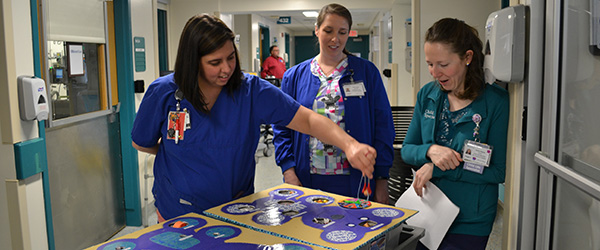Child life specialists help children cope with illness, hospitalization

At Kentucky Children’s Hospital, a special group of professionals work to help children and teens in a special way.
The child life specialists at KCH are healthcare professionals who specialize in assisting children and families while they are in the hospital. These specialists help young patients understand their medical treatment so that they can master the challenging situations associated with illness and positively cope with the stress from the hospital and treatments.
Here’s what you should know about what child life specialists do:
What tools does a child life specialist use?
A child life specialist’s tools are not typical medical tools like a stethoscope or needle. Instead, these professionals rely on bubbles, dolls, superheroes, video games, musical toys, etc.
Basically, child life specialists incorporate the items that every child loves – toys – into the medical environment.
All children use play to learn and grow, so by incorporating the idea of play, child life specialists help children learn about a new diagnosis, master painful procedures or treatments, manage emotions and feelings associated with illness, and positively cope during hospitalization.
Research has proved that a child who engages in play interventions provided by child life specialists heals faster and requires less medication during procedures.
How does a child life specialist help children?
There are many scary things that a child or teen may encounter at the hospital, especially the unfamiliar medical equipment.
For hospitalized children and teens, a child life specialist can provide medical play with real and pretend medical equipment to make the unfamiliar more familiar. For example, the specialist can teach a child about a procedure such as an MRI or can teach the child the steps to getting an IV.
Child life specialists can help a child or teen identify ways to cope with procedures or pain through blowing bubbles, relaxation techniques and other forms of distraction. They even stay with the child during procedures to provide more support and coaching.
These play experiences can make the hospital less scary, make time go by faster and help a child complete a treatment or medical task in a fun way. From crafts to video games, child life specialists’ interventions can help a child release strong emotions in a safe way.
Where do child life specialists work?
At KCH, child life specialists provide all of these services to children and families admitted to the Pediatric Emergency Department, in-patient units, the Pediatric Intensive Care Unit, the Neonatal Intensive Care Unit, the Pediatric Sedation and Outpatient Unit, and the Dance Blue Hematology/Oncology Clinic.
How do I become a child life specialist?
The Association of Child Life Professionals sets the standard for the training that every prospective child life specialist must complete prior to obtaining Child Life Certification. For more information on how to become a child life specialist, please visit the Association of Child Life Professionals website at www.childlife.org.
Next steps:
- Learn more about the Child Life Program at KCH, which also includes a school program so that patients can keep up with their studies while in the hospital.
- After a series of frightening ER visits, the Chaney family didn’t know if their young son, Kase, would ever receive a diagnosis. But a chance encounter with a doctor at KCH led to the start of his recovery. Find out how the 3-year-old is doing now.




